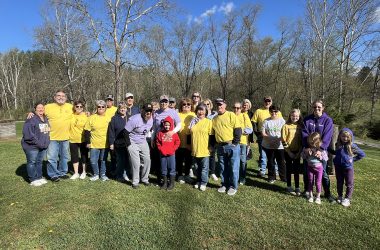Numbers 20:1-13
“But the Comforter, which is the Holy Ghost, whom the Father will send in my name, he shall teach you all things . . .” (John 14:26). The Holy Spirit indwells New Testament believers. The Holy Spirit teaches us all things. All things include understandings of Old Testament scriptures that were hidden from us before we knew Jesus Christ as our Lord and Savior. It is by and through the Holy Spirit that believers are given the ears to hear that which is in the text before us.
In verses 2-5, we see a people who have gathered themselves together against Moses and Aaron. We see a people who lashed out against God, saying, “Would God that we had died when our brethren died before the Lord!” We see a people who accused Moses of bringing them up out of Egypt to die in the wilderness. We see what Moses saw. The picture that we see is the picture that the Lord wants men to see and consider.
What follows in verses 6-8 is the Lord’s response to the picture that He has placed before us. The Lord reveals Himself to us through His instruction to Moses. He told Moses to take the rod in his hand, to gather the people, and, then with Aaron, speak to the rock such that the rock would bring forth his water so that the congregation and their beasts might drink.
The people had repeatedly disobeyed the Lord. The people had no understanding of the God of Abraham, Isaac and Jacob who led them up out of Egypt. Who is the God of Abraham, Isaac and Jacob? He is One who causes life-giving water to gush from the rock such that men may know Him. He is the God who responds to the words of them whom He has chosen. The God of Abraham, Isaac and Jacob is the God which New Testament believers know.
Because of that which followed in verses 10 and 11, the people did not see the God of Abraham, Isaac and Jacob. They did not see the God which New Testament believers know. Moses did not speak to the rock. Moses spoke to the people, in anger, saying, “Hear now, ye rebels; must we fetch you water out of this rock?” In anger, Moses struck the rock. The people saw anger. Because of Moses’ actions, the people did not see the God who “. . . commendeth his love to us, in that, while we were yet sinners, Christ died for us” (Rom. 5:8). They did not see the God who is gracious to whom He will be gracious and will show mercy on whom He will show mercy (Ex. 33:19).
Moses suffered loss because he did not do as the Lord had directed him. Moses would see, but, would not be allowed to enter into the promised land. Moses is listed in Faith’s Hall of Fame (Hebrews 11). Moses knew the God of Abraham, Isaac and Jacob. On numerous occasions, Moses made the God of Abraham, Isaac and Jacob (the God that he knew) known to the children of Israel. On this occasion, however, he disobeyed the Lord. Consequently, he suffered loss.
New Testament believers know to do good but do always do good. “. . . him that knoweth to do good, and doeth it not, to him it is sin” (James 4:17). New Testament believers have an advocate with the Father who is faithful and just to forgive us our sins, and to cleanse us from all unrighteousness when we confess our sins (I Jn. 1:9).
Moses suffered loss because he did not do as the Lord directed him to do. New Testament believers are instructed to make the God of Abraham, Isaac and Jacob known to all people. We have been commanded to go, to teach, and to baptize in the name of the Father, the Son, and the Holy Spirit. We know to do good. Let us not suffer loss.
The scene in Numbers 20:2 is amazingly similar to a scene that took place forty years earlier at Rephidim (Ex. 17:1-7). The people chided Moses on both occasions because there was no water. On both occasions, Moses smote the rock and life-giving waters issued forth and the people drank. On both occasions, the people saw water come forth from the rock. On both occasions, the people drank and were filled.
The Lord, both at Rephidim and in the text before us, was faithful to provide for His people. The Lord is so good. The Lord was not hindered by the sin of Moses in doing good.
The sin of Moses prevented the children of Israel from seeing God’s goodness. The Lord wanted the people to see Moses hold the rod in his hand and speak to the rock. The rod was the same rod which the people saw Moses stretch over the sea and the waters divided. The rod was the same rod which the people saw Moses strike the rock forty years earlier. At the crossing through the sea and at Rephidim, Moses used the rod (symbolic of power) as He was directed.
The Lord was sanctified at the sea and at Rephidim because Moses obeyed. The Lord will be sanctified in them who hear and obey. May we hear what the Spirit speaks.



